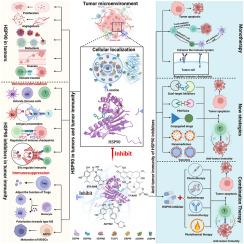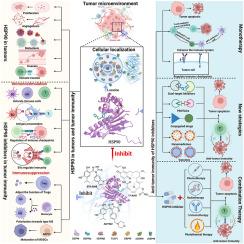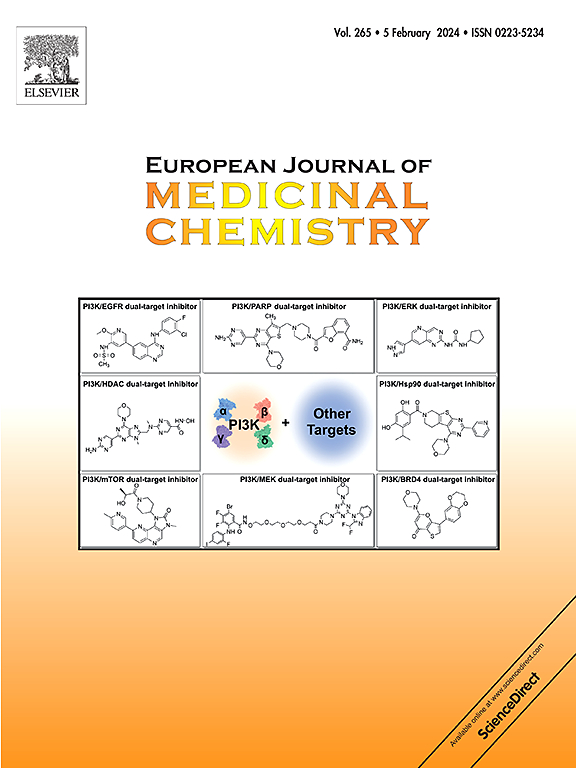HSP90 inhibitors in cancer immunotherapy: Therapeutic opportunities and challenges
IF 5.9
2区 医学
Q1 CHEMISTRY, MEDICINAL
引用次数: 0
Abstract
Heat shock protein 90 (HSP90), a highly evolutionarily conserved molecular chaperone, plays critical roles in both physiological processes and disease pathogenesis, with particularly prominent involvement in cancer initiation and progression. Emerging evidence highlights the multifaceted functions of HSP90 within the tumor immune microenvironment, including mediation of immune evasion mechanisms, induction of tolerance/suppressive phenotypes, and facilitation of angiogenesis and metastatic dissemination. Notably, aberrant HSP90 accumulation (intracellularly and extracellularly) drives oncogenic signaling and promotes tumor survival and metastasis through immunomodulatory mechanisms. The pharmacological inhibition of HSP90 demonstrates dual therapeutic benefits: selective targeting of malignant cells and reprogramming of the immunosuppressive tumor niche, thereby exhibiting remarkable translational potential. In cancer immunotherapy, HSP90 inhibitors synergize with immune checkpoint blockade, chemotherapy, radiotherapy, and hyperthermia therapy by enhancing tumor immunogenicity and eliciting robust antitumor immune responses. Furthermore, the ongoing development of isoform-selective inhibitors and dual-targeting agents represents a paradigm shift toward precision therapies that maximize efficacy while minimizing off-target effects. This review systematically examines HSP90's structural biology, its multifaceted immunoregulatory roles in malignancies, and the clinical promise of HSP90-targeted combinatorial immunotherapies. We further discuss emerging research frontiers and translational challenges, providing a strategic framework for advancing next-generation cancer immunotherapies.


肿瘤免疫治疗中的热休克蛋白90抑制剂:治疗的机遇和挑战
热休克蛋白90 (HSP90)是一种高度进化保守的分子伴侣,在生理过程和疾病发病机制中起着关键作用,特别是在癌症的发生和发展中起着重要作用。新出现的证据强调了HSP90在肿瘤免疫微环境中的多方面功能,包括介导免疫逃避机制,诱导耐受/抑制表型,促进血管生成和转移传播。值得注意的是,异常的HSP90积累(细胞内和细胞外)驱动致癌信号,并通过免疫调节机制促进肿瘤生存和转移。HSP90的药理学抑制显示出双重治疗益处:恶性细胞的选择性靶向和免疫抑制肿瘤生态位的重编程,从而显示出显著的翻译潜力。在癌症免疫治疗中,HSP90抑制剂通过增强肿瘤免疫原性和引发强大的抗肿瘤免疫反应,与免疫检查点阻断、化疗、放疗和热疗协同作用。此外,异型选择性抑制剂和双靶向药物的持续发展代表了向精确治疗的范式转变,在最大限度地提高疗效的同时最小化脱靶效应。本文系统地研究了HSP90的结构生物学,其在恶性肿瘤中的多方面免疫调节作用,以及HSP90靶向组合免疫治疗的临床前景。我们进一步讨论新兴的研究前沿和转化挑战,为推进下一代癌症免疫疗法提供战略框架。
本文章由计算机程序翻译,如有差异,请以英文原文为准。
求助全文
约1分钟内获得全文
求助全文
来源期刊
CiteScore
11.70
自引率
9.00%
发文量
863
审稿时长
29 days
期刊介绍:
The European Journal of Medicinal Chemistry is a global journal that publishes studies on all aspects of medicinal chemistry. It provides a medium for publication of original papers and also welcomes critical review papers.
A typical paper would report on the organic synthesis, characterization and pharmacological evaluation of compounds. Other topics of interest are drug design, QSAR, molecular modeling, drug-receptor interactions, molecular aspects of drug metabolism, prodrug synthesis and drug targeting. The journal expects manuscripts to present the rational for a study, provide insight into the design of compounds or understanding of mechanism, or clarify the targets.

 求助内容:
求助内容: 应助结果提醒方式:
应助结果提醒方式:


